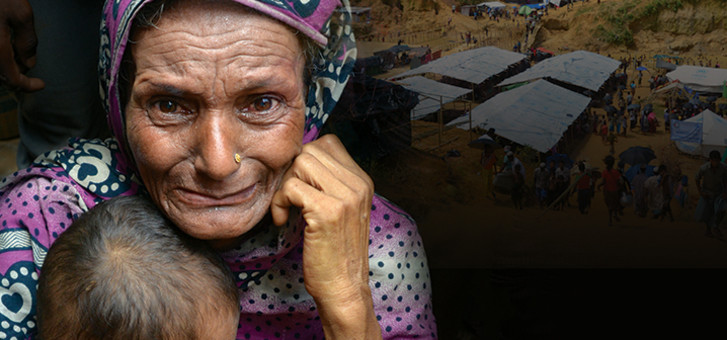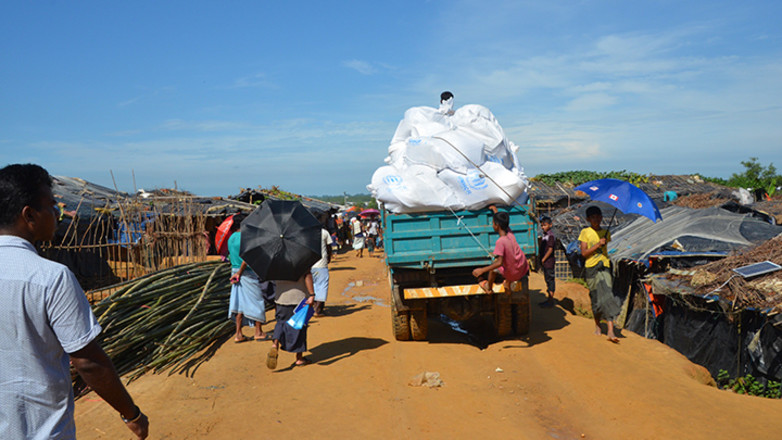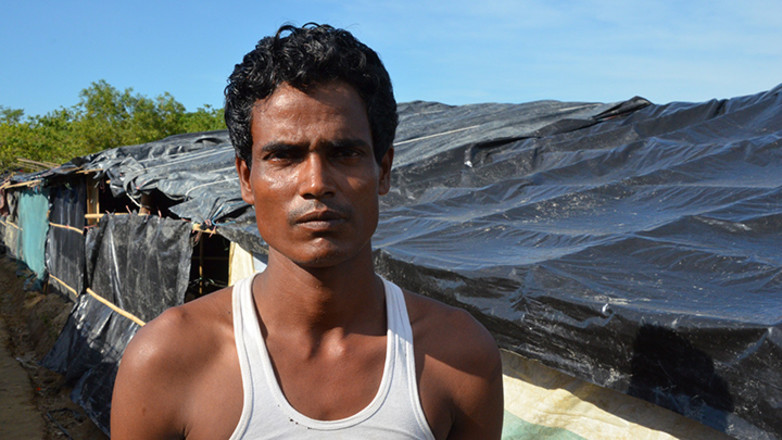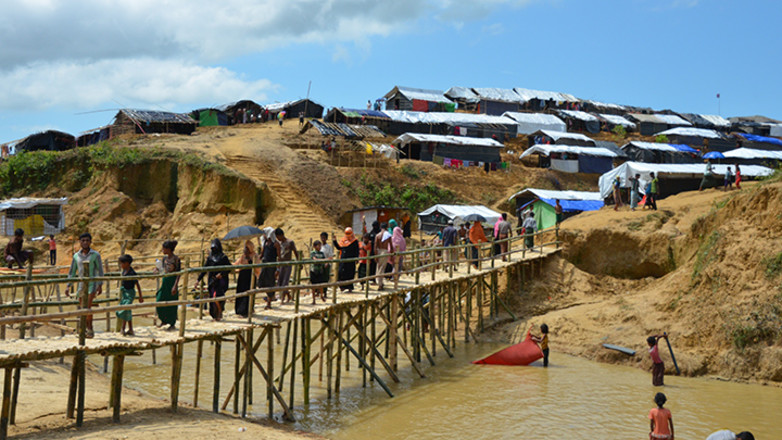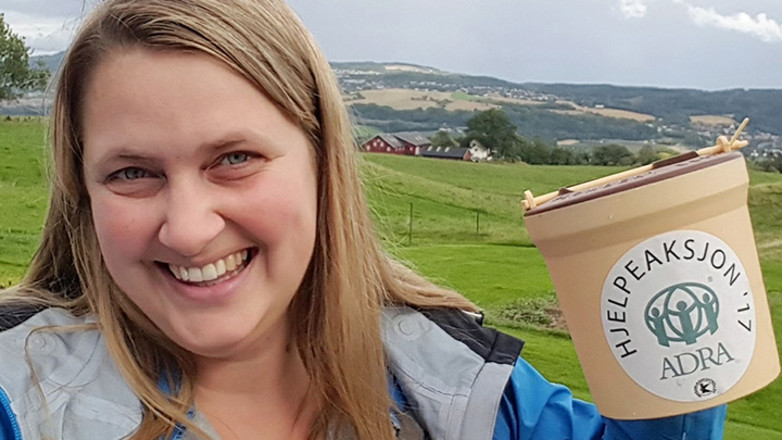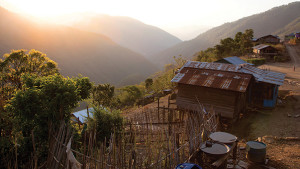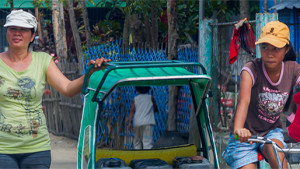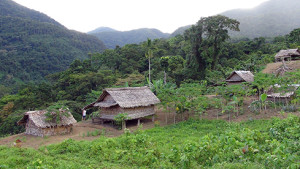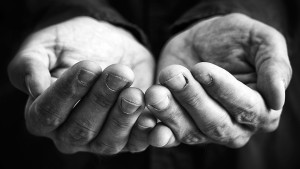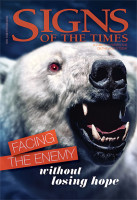As we drive into the refugee camp everyone in the car falls silent and just looks through the windows. I almost cannot believe my eyes: shelter after shelter decorates the hills, in the forest, anywhere where there is space. Everywhere. And so many people.
People walking on the road, sitting in every available patch of shade, waiting for a plot of land. I have never seen anything like this. Trees have been cut down. It’s messy, it’s muddy, it’s crowded—it’s desperate.
We continue our journey further south. Everywhere there are refugees and shelters. Our organisation, the Adventist Development and Relief Agency (ADRA), has been assigned the two newest camps where refugees are arriving daily. It takes more than two hours to drive to get there from our base. It’s not far away but the roads are narrow and the masses of cars and trucks and people slow our progress.
Ahead, someone throws relief items from a car. People start running to get hold of something. Last week, we heard that a number of refugees were killed because of such sloppy distributions, crushed in a crowd desperate for the aid.
Finally we reach our designated area and the road narrows. This camp looks like it has been here for a while. And it has. This was one of the first camps. Refugees in this settlement have been here for around 10 years. But new families have started to arrive, and they are trying to settle outside the existing camp. Local landowners are renting out their land to accommodate them.
As we walk to find the new arrivals, we meet people from another NGO and ask them if they know where the new arrivals are staying. “They’re over there, across the stream. Wouldn’t put my feet in it if I were you,” they quip.
We walk further along the bank to see if there is a better place to cross, but there is no way other than to wade through the dirty little stream. So we take off our shoes and do just that. On the other side we’re met by weary shelters, some with tarpaulins to cover the walls, others with just enough for a roof. Many of the refugees received some rice and a tarpaulin when they arrived, but since then no-one has been there to help them.
In a shelter without walls, I find Mina and her family. There was unrest in her village in Myanmar and the family was afraid, so they decided to flee to Bangladesh.
“We took three days to cross over to Bangladesh. We walked through the jungle and when we came to the river, we didn’t have any money to take the boat. But someone was kind and paid for us, so we managed to get over,” she says.
It’s been three weeks since Mina and her family left Myanmar. They stayed in a number of locations before getting to this camp.
“Someone gave us money so that we could buy tarps and bamboo and we got some rice from the World Food Program,” says Mina. When asked about their urgent needs, Mina says: “We need shelter, food, cooking pans, water, a toilet and a bridge! The most important is shelter. Look, there are no walls on this shelter. There are also no fences around us for protection.”
A man has been standing behind me, listening as we interview the family. He approaches our translator. His name is Sajed and he wants to tell his story. We walk with him to his shelter, where his five children are waiting for him.
“The shooting started early in the morning. Many did not have time to run from their houses,” says Sajed. His eyes are red and full of pain as he remembers. “I quickly grabbed the children and ran. In the chaos, I did not find my wife. After I had got the children to a safe space, I ran back to look for her, and I found her, but she was dead.”
We stand in silence. I look at the five children, the youngest around 18 months old and the oldest about seven. It could not have been an easy journey for Sajed.
“I buried my wife. Not properly, but as well as I could. Then I ran with the children. We hiked over the mountains and reached the beach on the other side. We had to wait the whole night for a boat to take us across the river,” he says.
Sajed and the children have been in Bangladesh for 19 days. For the past week they have been here with other newly arrived refugees. Life is tough for the family.
“Some people were able to bring some things from their homes, but I did not have the chance to bring any items. Two of my children are sick with diarrhoea. I need medicine for them.
“We got some rice, potatoes and water one time, but it is not enough. We need more food. But even if there was a distribution, how would I be able to go there? I cannot leave my children alone,” says Sajed.
The next day, I come across a boy playing with a homemade boat in the same dirty stream I’d crossed barefoot yesterday. I remember the Norwegian children’s song “Min båt er så liten, og havet så stort,” translated, “my boat is so little, and the ocean so big.”
I’m feeling overwhelmed by this crisis—how can one small person like me make a difference in this sea of suffering? It’s easy to become discouraged, but we have to retain hope. Even if we can’t help everyone, we can make life better for some.
ADRA Facts: Myanmar & Bangladesh
ADRA first began working in Bangladesh in 1971 and Myanmar/Burma in 1985.
In Bangladesh, ADRA strives to empower women through literacy training, microfinance loans and small-business management by supporting farmers with innovative agriculture practices, children with school enrolment and test preparations, and the nation with tree planting.
A typical refugee food parcel in Bangladesh contains lentils, salt, sugar and oil to complement rice provided by the United Nations World Food Program.
As one of the first established NGOs in Myanmar, ADRA has maintained strong partnerships with local agencies to deliver projects in health, education, sustainable livelihoods and humanitarian response. ADRA Myanmar has helped improve the economic status, health services and living conditions throughout 12 of Myanmar’s 14 states and regions.
ADRA assisted more than 1.5 million refugees, internally displaced and stateless people around the world in 2016.
Donate to ADRA’s refugee efforts:
- Australia: adra.org.au/Rohingya
- New Zealand: adra.org.nz/Rohingya
Britt Celine Oldebraten works for ADRA Norway. She is in Bangladesh assisting with ADRA’s response.

